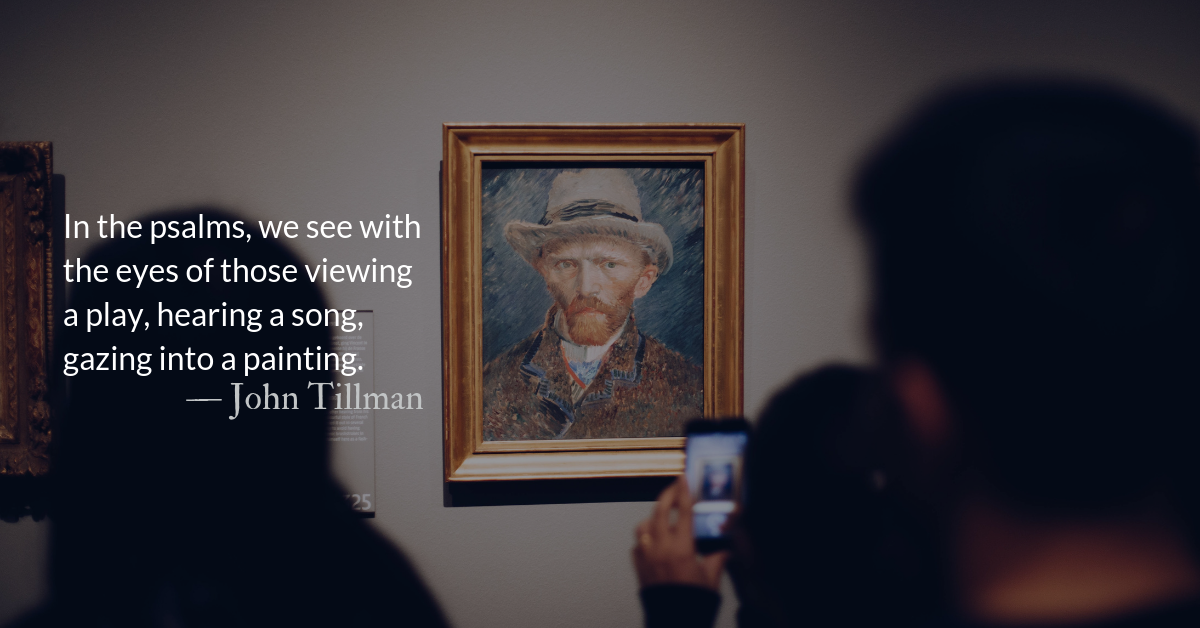Psalm 57.1, 4
Have mercy on me, my God, have mercy on me,
for in you I take refuge.
I will take refuge in the shadow of your wings
until the disaster has passed.
I am in the midst of lions;
I am forced to dwell among ravenous beasts—
men whose teeth are spears and arrows,
whose tongues are sharp swords.
Reflection: Artful Prayers
By John Tillman
All scripture is “useful for training in righteousness,” but what scripture is—what mode and form of writing it takes—affects how we engage with it.
Lists of legalities in Leviticus may leave us dry. Genealogical records may excite us only when scandalous details grab our attention. Histories of heroes and villains may be thrilling and inspiring, but can often lead us astray if we are foolish enough to think we are always intended to religiously copy the actions and choices of historical figures. The fully flawed and un-idealized humans recorded in scripture show us more of their sins than their virtues. When rightly read, the lives of even heroes like David are perhaps more cautionary than they are aspirational.
One of the reasons that the psalms are so engaging to any reader of God’s Word is that they are works of art and carry with them the inherent timelessness that great artworks possess. In the psalms, we see with the eyes of those viewing a play, hearing a song, gazing into a painting. We are here to enter the lived emotion of the artists who bared their souls to God in prayers that were always intended to be performed.
The psalms are not merely a private diary of rants and ravings to God, they are intended for an audience of humans. Some are written “to the director of music,” to be performed chorally. Some are “maskils,” instructive, pedagogical poetry that is intended to teach a lesson. Some are “songs of ascents,” to be sung as one climbed the Temple mount to worship. Psalms are intended for us to see them, hear them, perform them, and to participate emotionally with them. Psalms are intimate in the same way a play performed in a 1200 seat theatre is intimate.
In the psalms, we aren’t going to be told what to do in the office today when someone insults us. But we can see the inner emotional reality of someone whose friends were betrayed to death and who is now hiding in a cave. We won’t get three practical points about how to tell someone about Jesus, but we will get to see the world’s wonder through the eyes of an artist painting a descriptive thank you to a loving creator.
All art is not scripture. But all art preaches. Many times art preaches more effectively than a sermon.
May we live artfully in the power of the Holy Spirit, creating with our lives a prayer that may be seen, heard, felt, and may cause those viewing it to join tearfully in our sufferings, and joyfully in our celebrations.
Prayer: The Request for Presence
Show me your marvelous loving-kindness, O Savior of those who take refuge at your right hand from those who rise up against them. Keep me as the apple of your eye; hide me under the shadow of your wings. — Psalm 17.7-8
– From The Divine Hours: Prayers for Springtime by Phyllis Tickle.
Today’s Readings
Numbers 19 (Listen – 3:39)
Psalm 56-57 (Listen – 3:11)
This Weekend’s Readings
Numbers 20 (Listen – 4:15) Psalm 58-59 (Listen – 3:32)
Numbers 21 (Listen – 5:03) Psalm 60-61 (Listen – 2:27)
Thank You!
Thank you for reading and a huge thank you to those who donate to our ministry, keeping The Park Forum ad-free and enabling us to continue to produce fresh content. Every year our donors help us produce over 100,000 words of free devotionals. Follow this link to support our readers.
Read more about How to Grow in Prayer
Mastering the art of prayer, like anything else, takes time. The time we give it will be a true measure of its importance to us.
Read more about Prayer, Our Tent of Meeting
For us, prayer is our tent of meeting, where the deepest thirsts of our souls may be satisfied.







